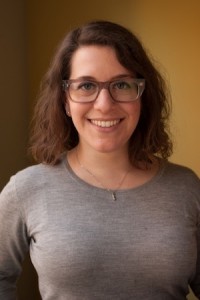Caitlin McCarthy and Amitai Marmorstein co-star in What You’re Missing by Tamara Micner, which is at Chutzpah! March 10-15. (photo by Tim Matheson)
Playwright Tamara Micner returns to Vancouver in March for the North American première at Chutzpah! of What You’re Missing, a play based on her family’s stories, but in which we will all, no doubt, see aspects of our own experience.

Micner left Vancouver in 2003 for Yale, where she earned her bachelor of arts in English literature. She worked with Google for a few years, which took her to San Francisco and Toronto, then studied at Cambridge, receiving her master’s of philosophy in 2011. When she last spoke with the Independent, she was on her way to London, England, because, as she told the JI, “for plays, London is the best city in the world.” There, she has continued learning and working, not only in theatre, but also as a journalist and copywriter. The JI caught up with Micner earlier this month.
JI: When the JI last spoke with you, Fantasmagoriana was at the Edinburgh Festival Fringe, and you also had two new plays in the works, one of which was called Highlight. Could you share some aspects of its development, from its première at Cambridge in 2011 as Highlight to its run last year as What You’re Missing at King’s Head Theatre in London, to its upcoming production at Chutzpah?
TM: What You’re Missing has been in the works for four years, and hopefully it will continue to live after Chutzpah as well.
We started developing the play during my master’s degree at Cambridge, with a rehearsed reading and a run at the main student theatre. I then left it for awhile and worked on other projects, and gave myself time to come back to it with greater distance and a clearer head.
In 2013, I did more rewrites and started submitting it to theatres in London, including the King’s Head, which accepted it for final development. By the time we performed it last year, it was pretty well “finished.”
It’s gone through many rounds of changes. It started out more purely comedic and, over time, it’s gotten more political and more serious, alongside the comedy that (hopefully) pervades the piece.
JI: You described Highlight in the 2011 JI interview as being based on the beginning of your parents’ relationship, and as “a dysfunctional family comedy.” In general, what has been the reaction of family (and friends) to the plays in which they see themselves represented? Do you have any advice for aspiring writers as to how to use family/friend elements without causing (too many) hard feelings?
TM: My sense is that my relatives who inspired the characters in What You’re Missing have enjoyed seeing versions of themselves and their experiences represented onstage. (Or they’ve just been polite.) The play is critical and truthful, but it’s also a dramatization, and it’s written from a place of love and affection, which I think comes through. I wasn’t alive in the 1970s, when this play is set, so it’s drawing from elements of my family’s stories – from a specific time, place and set of experiences – to explore broader questions about family, love, politics, religion, gender and so on.
When we debuted the play in London, people of different nationalities, religions and backgrounds said that they related to the story and characters, and saw themselves or their lives reflected in the piece in some way. That response really pleased me (and was a relief!) because that was my hope. I see theatre as, among other things, a way to bring people together and remind us of the things we share.
I think artists need to share their truths, and personal experience is where a lot of our truths come from. That might cause hard feelings. But, if we’re honest and nuanced, rather than heavy-handed, people will respond and connect to the work, and the truth in it will come through.
JI: In 2011, you said that you chose to move to London for its theatre presence and because you loved the city. Has the city lived up to your expectations? Do you plan on staying for the foreseeable future?
TM: I’m very happy living in London. I’ve found a neighborhood and communities that I feel at home in, including easy access to pita, dates and baklava, and I’m still discovering more of the city and the country. I was approved for Polish citizenship last year, so assuming the U.K. doesn’t vote to leave the EU, I plan to stay here indefinitely.
JI: Will you be coming to Vancouver for the Chutzpah shows? If so, how much input, if any, will you have into this production? Did you have any hand in casting?
TM: Yes, I will be in Vancouver for the run. I’ve met with the director, John Cooper, in person and on Skype, and we’ve talked about the origins and development of the play and his vision for the production. He oversaw the casting, and I trust his instincts and judgment. It’s exciting to see how other people interpret your work and bring it to life, sometimes in surprising ways.
JI: Are there any projects you have currently on the go, or that you’re considering undertaking, that you would like to share with JI readers?
TM: I’m developing a new show, Wink the Other Eye, with two actors and a musician. It’s about music hall, a major genre of British entertainment from the mid-19th century until about the ’20s (when ragtime and revue, and radio, started taking over). For example, if you know the song “Daisy Bell,” that’s actually from music hall.
The show is devised – collaboratively created and written – which is a new style of working for me. We plan to do some showings of the piece in the spring, working toward a production later this year. We’ve been approved for funding from Arts Council England to finish development, which is a big help and a stamp of credibility.
Our show looks at Marie Lloyd, one of the most famous performers of her day, who toured the British Empire (South Africa, Australia, North America) and sang from the age of 15 until she died aged 52. She had a story similar to Whitney Houston’s, Judy Garland’s: an insatiable entertainer who lived to perform and had a pretty awful life offstage (including domestic abuse and alcoholism). The show combines live performances of her songs with important moments from her private life, and the actor who plays her is related to her. (We’ve put some of the music and comedy from the show online: soundcloud.com/winktheothereye.)
What You’re Missing is at the Rothstein Theatre from March 10-15. The other theatre offering is Kafka and Son, performed by Alon Nashman, on March 2. Visit chutzpahfestival.com for more information on these and other productions.

